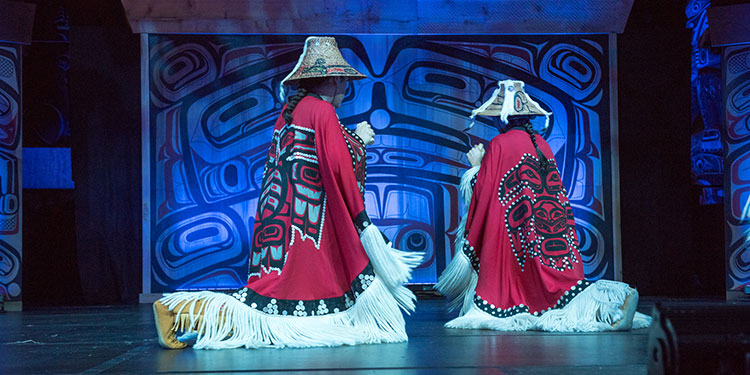Latest News
Dancing through history, right to your heart
From Tuesday Feb. 27 through Sunday March 4,
the UBC Museum of Anthropology (MOA) hosts the 2018 Coastal First Nations Dance
Festival with groups from up and down the North American west coast as well as
international performers.
MOA’s 11th annual Coastal First Nations Dance
Festival showcases dancers who hail from many First Nations, including the Tsatsu
Stalqaya or Coastal Wolf Pack which according to dancer, Francis James,
translates directly as, “Beach Wolves, because our language has no word for
coast or coastal.”
The Musqueam have a long history that reaches
back millennia. On the traditional, ancestral, and unceded territory of the
Musqueam people Richmond has once-thriving villages and sacred sites, over
three times older than the pyramids of Egypt, buried under the Fraser River’s
silt. In fact, Vancouver was the site of a city of over 100,000 people before
European contact.
Tsatsu Stalqaya is a 2010 Olympic legacy. “Originally,
we started in 2009 leading up to Vancouver Olympics and I was getting a bunch
of phone calls to do Coast Salish openings and reopening of various venues
before the Olympics.” So the Coastal Wolf Pack dancers were formed.
“Our group is based out of Musqueam. We’re
all family or married into family, but, we’re not just Musqueam. Our root
families are Musqueam, Squamish, Lil'wat, Sto:lo, Saanich, Nanaimo, Okanagan,
Dene, Yakama, Tsleil-Waututh,” James says.
For his regular job, James works at the
Spirit of the Children Society, a non-profit society that serves families in
the Burnaby, New Westminster, and the Tri-Cities area. The society works to
empower and strengthen Indigenous families by providing support and resources
through the programs offered.
James discusses what people may see at their
Sunday performance: “Some of our dances relate to some of our traditional
stories of how our people were before contact. One of them would be the story
of look-out men or runners; they would be like somebody that stood guard at the
farthest part of our territories and run messages from tribe to tribe inviting
them for ceremonies or some sort. So we pay respect to that, someone almost all
up and down the coast they would have that role before contact.”
James lists other dances in Tsatsu Stalqaya/
Coastal Wolf Pack’s repertoire: “We pay respect to our old warriors, their
histories, the history of our canoe paddling which is how we travelled before
contact.”
Some stories, bestowed by one generation to
the next, were not meant to be shared with everyone. James say the dance group
had much to consider before setting their repertoire, “See, our cultural
ceremonies are very closed. We had to consult with some of our older family
members what we could and couldn’t do. “
The First Nations’ histories are oral but not
like Granddad’s old tall tales that got better, and less true, with each
telling but rather more like Ray Bradbury’s story Fahrenheit 451, of a time
when banned books were learned verbatim, and passed down that way from each
generation, as a gift and a responsibility.
Sometimes the settlers’ written historical
records echo the long, oral traditions of First Nations. Sometimes, it’s with a
twist.
James talks of one of the group’s dances: “We
pay tribute to the old runners, they were kind of like mailmen as well. One of the
unwritten stories was when Simon Fraser was doing his little tour of BC, when
he came down the river somewhere, he wrote this down in one of his writings;
somewhere up the river, he took canoes without asking, and [the local First
Nation] sent their runners who came down ahead of the canoes and told the
people at the mouth of the river that Fraser and his men were travelling in
stolen property and the people at the mouth of the river turned him away and
told him he could not pass through.”
Fraser, kept a diary. James continues the
story about the explorer, “In his book he wrote he was greeted with hostile
Indians.”
James says, “It’s a history we learned from
our Musqueam elders. Once in a while, depending on where we are, we will share
that story. It proves that our people don’t turn you away for no reason.”
If the energy of the crowd needs lifting,
James says they do a dance about Slahal:
“It’s a stick game. Slahal’s our oldest
gambling game, more so on the western part of North America. It’s basically a
gambling game. They play it all up and down the coast. They play it as a money
gambling game.”
According to James, sometimes there can be
more than bragging rights at stake, “Some tournaments are $25,000 for first
place. Many families can claim it comes from their territories, it’s that old.
We pay respect to that, it’s fun, it’s very energetic.”
Yet another dance option of the group, James
says, “Sometimes we share how young men would have to come and get the family
before they would be allowed to court a young lady.”
“Sometimes we change what we’re going to do
depending on the crowd. Sometimes it calls on an energetic song lift everybody.
We try to have a good time and educate though that good time,” says James.
Mostly what can people expect when they see
Tsatsu Stalqaya or Coastal Wolf Pack? “We will have fun, interact with the
audience. We try to educate with
the little bit of talking we have.”
According to James, their message is: “We
were here before and we are here today and we are going to be here tomorrow.”
For schedule and ticket information, cut and paste:damelahamid.ca/coastal-dance-festival/program/




























